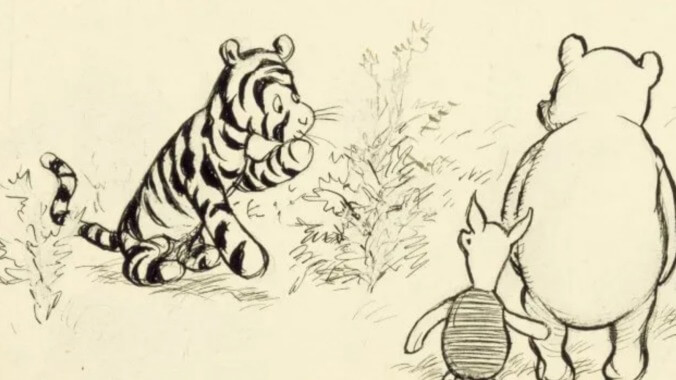Everything entering the public domain this year besides Steamboat Willie
Mickey Mouse grabbed the spotlight, but plenty of other notable works and characters are shedding copyrights in 2024

Almost as soon as the clock struck midnight on New Year’s Eve, “Steamboat Willie” memes started flooding the internet. And just two days into 2024, a handful of horror movies and games are already in the works based on this version of Mickey Mouse from the 1928 cartoon short. While Mickey has become the poster mouse for this kind of exploitation, there are plenty of other famous works now free for anyone to use as they wish as the calendar flips to a new year.
In fact, “Steamboat Willie” isn’t the only Mickey Mouse cartoon produced in 1928 to enter the public domain this year. Walt Disney directed a silent short titled “Plane Crazy,” featuring Mickey, Minnie, and Clarabelle Cow. The short wouldn’t get a theatrical release until the following year, after being converted into a sound cartoon, but Disney submitted it for copyright in 1928 shortly after a test screening, making it eligible for the public domain now. Another new arrival from the same year is the Mickey-led short “The Galloping Gaucho,” a parody of the 1927 film The Gaucho, starring Douglas Fairbanks.
These two Mickey Mouse shorts introduced distinctive features that aren’t present in “Steamboat Willie,” like shoes and anthropomorphized white eyes with black pupils, so images including them aren’t necessarily off limits. All three of them were made for a mature audience, before the studio pivoted to family friendly fare, so the deliberately provocative parodies of Mickey that have started to appear aren’t as far from the original as people may think. A handful of cartoons starring Mickey precursor Oswald the Lucky Rabbit also lose their copyright status this year.
Understandably, creators were anxious to get their hands on Walt Disney’s most famous character, despite (or maybe because of) the company’s best efforts to keep that from happening. There’s no shortage of irony here, considering the studio built its legacy on adapting public domain works like Cinderella and Sleeping Beauty and turning them into animated blockbusters.
Tigger, another big name with ties to Disney animation, also bounces into the public domain in 2024. The character was introduced in 1928 in A.A. Milne’s The House At Pooh Corner. Winnie-the-Pooh and other characters from the Hundred Acre Wood have been free of copyright and Disney’s exclusive claim since 2022—that’s how we got Winnie-the-Pooh: Blood and Honey last year—but Tigger is a new addition to the pantheon. Blood And Honey 2 is already due next month, with Tigger added into the mix.
Books entering the public domain in 2024
Several new books in the public domain have already been made into films, including Orlando by Virgina Woolf, and Erich Maria Remarque’s original German-language novel All Quiet On The Western Front (the English translation wasn’t copyrighted until later). The latter just got an Oscar-nominated adaptation in 2022, but it’s been more than 30 years since Tilda Swinton starred in the film version of Woolf’s gender-bending historical epic, so the time could be right for a revival. We might also see new takes on Lady Chatterley’s Lover by D.H Lawrence or the play The Front Page by Ben Hecht and Charles MacArthur, both of which have been adapted several times before.
In some cases, arrival in the public domain may generate interest in works that have never been adapted before, including notable books from the Harlem Renaissance like Dark Princess by W.E.B. Du Bois and Home To Harlem by Claude McKay, both published in 1928. This year also marks the entry of poetry collections by Robert Frost, Dorothy Parker, Edna St. Vincent Millay, E. E. Cummings, and Carl Sandberg into the public domain.
Films entering the public domain in 2024
Hollywood was still transitioning from the age of silent films and into a new era of talkies in 1928, and the year saw notable releases in both formats. The Singing Fool, the follow-up to 1927’s The Jazz Singer, came out that year as well an early gangster film billed as the “first all-talking picture,” called Lights Of New York. There were also a number of superb silent comedies released, like Buster Keaton’s The Cameraman, Charlie Chaplin’s The Circus, and the first Laurel and Hardy short, Should Married Men Go Home? Harold Lloyd also appeared in his final silent film in 1928, titled Speedy. All of these are now copyright free.
Films released in 1928 are also historic for being the first to be eligible for Academy Awards. The inaugural ceremony was held in 1929 and honored films released the year before, including Wings, the first film to win Best Picture.
Music entering the public domain in 2024
Copyrights for music performances can fall under different rules than books and films, which are currently limited to 95 years (technically copyrights expire at the conclusion of the 95th year). It gets even more complicated when you factor in the different standards for published music and audio recordings. Some of the songs you can now cover without paying royalties include “Mack The Knife,” “When You’re Smiling,” “I Wanna Be Loved By You,” “Let’s Do It (Let’s Fall in Love),” and “Makin’ Whoopee!” The recorded versions of these songs popularized by individual artists may still fall under copyright law, though. Recordings made in 1923, however, are free for use by the public, including familiar renditions of “Yes! We Have No Bananas,” “Who’s Sorry Now,” “The Charleston,” and Bessie Smith’s performance of “Down Hearted Blues.”
These works and many others belong to all of us now. So go forth, be inspired, and do what you will with them.